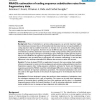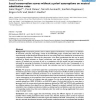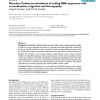21 search results - page 1 / 5 » FRAGS: estimation of coding sequence substitution rates from... |
BMCBI
2004
13 years 4 months ago
2004
Background: Rates of substitution in protein-coding sequences can provide important insights into evolutionary processes that are of biomedical and theoretical interest. Increased...
BMCBI
2006
13 years 4 months ago
2006
Background: Statistical methods for identifying positively selected sites in protein coding regions are one of the most commonly used tools in evolutionary bioinformatics. However...
BMCBI
2008
13 years 5 months ago
2008
Background: Comparative genomics aims to detect signals of evolutionary conservation as an indicator of functional constraint. Surprisingly, results of the ENCODE project revealed...
BMCBI
2007
13 years 4 months ago
2007
Background: Coalescent simulations have proven very useful in many population genetics studies. In order to arrive to meaningful conclusions, it is important that these simulation...
BMCBI
2011
12 years 12 months ago
2011
Background: In many environmental genomics applications a homologous region of DNA from a diverse sample is first amplified by PCR and then sequenced. The next generation sequenci...



